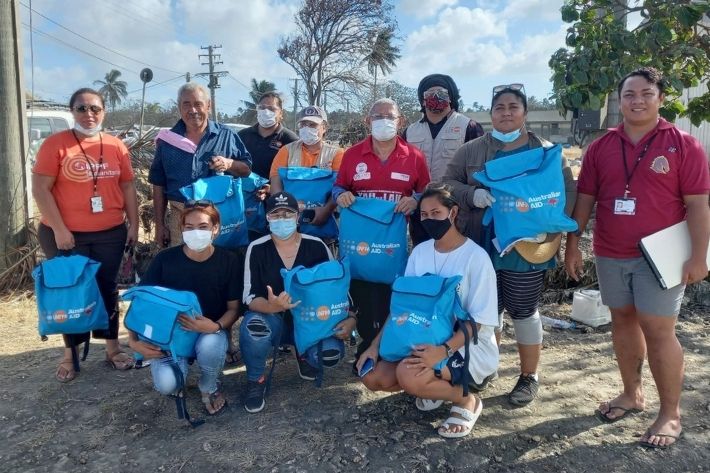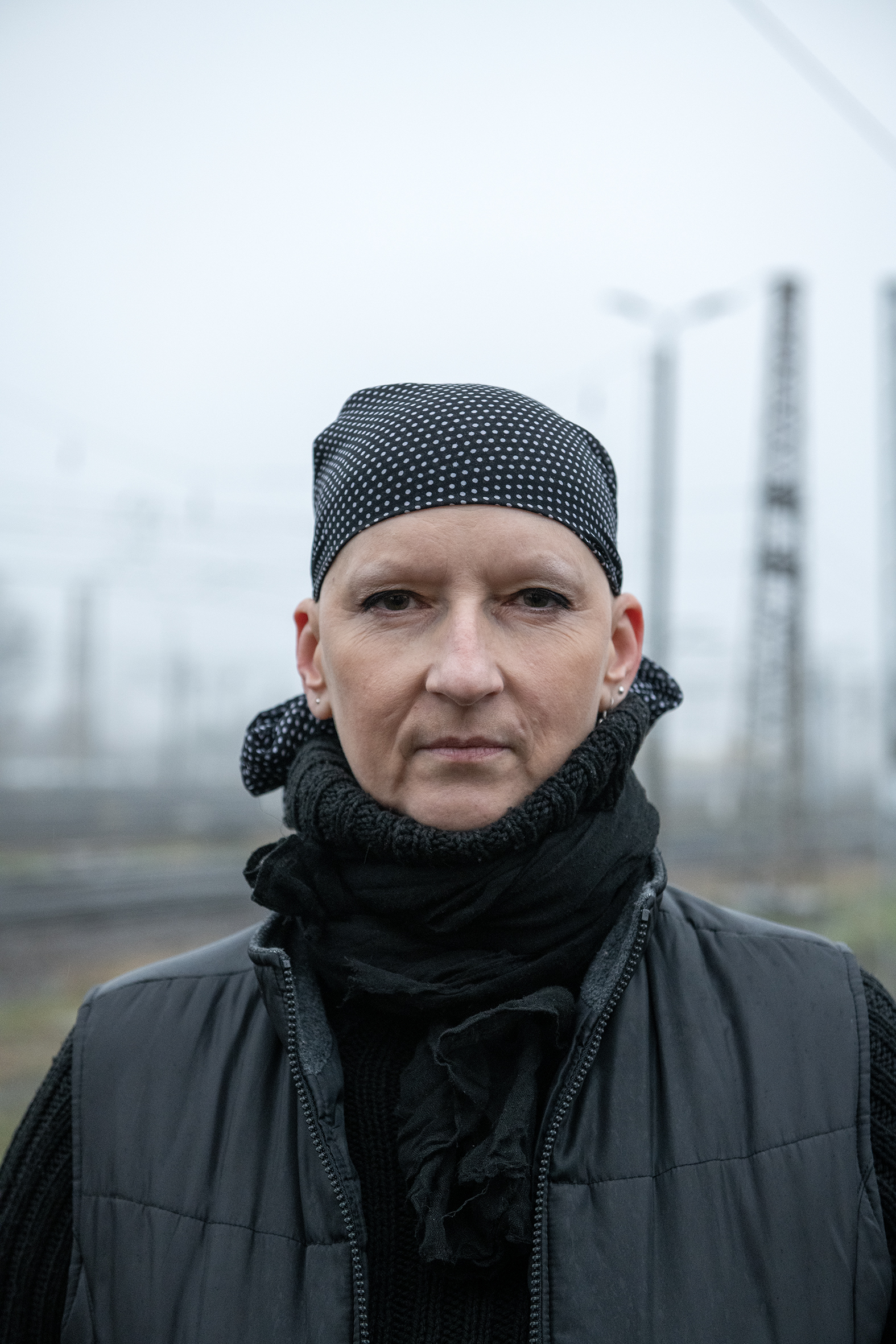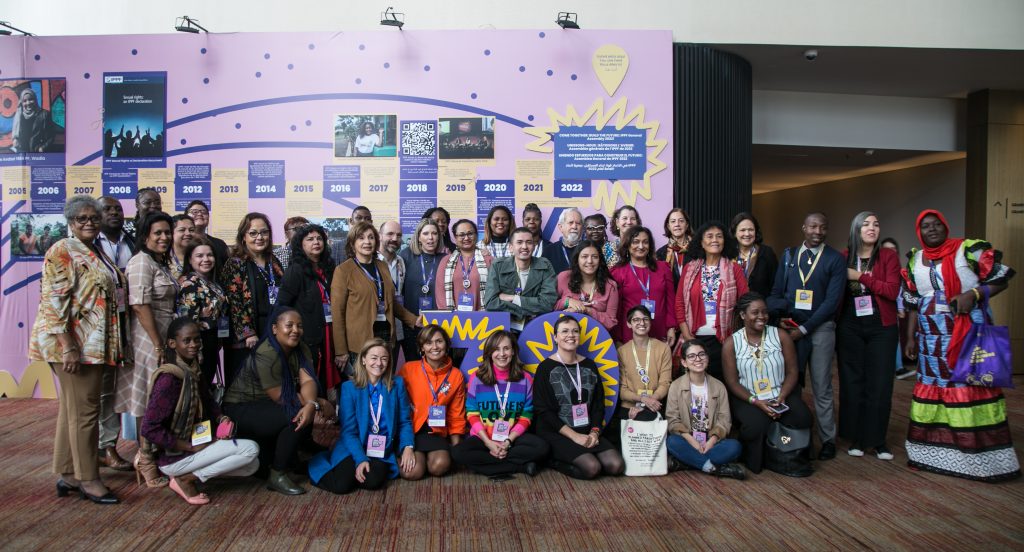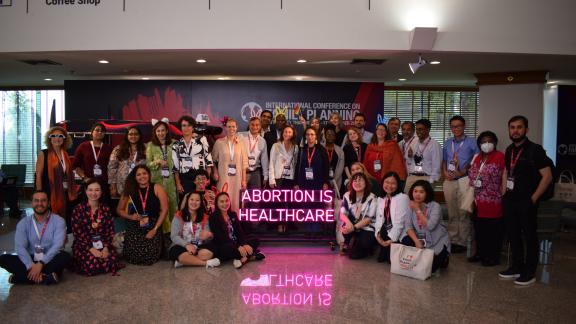While we can’t ensure that 2023 won’t bring its own set of challenges and adversity, we can promise to continue our work delivering sexual and reproductive health and rights to people who need it, wherever and whenever they need it.
There was hope at the start of 2022 that this year would bring more security and stability than in the previous year.
Instead, we’ve been presented with some enormous challenges to sexual and reproductive health and rights - from conflicts, to climate crises, to the rollback of rights and the rise in opposition movements in many countries around the world.
But at IPPF, we won’t let the opposition define us. We choose not to remember 2022 solely for its setbacks.
Here, we highlight some stories of positive change from our colleagues, clients and partners around the world.
Delivering care in a climate crisis
As Kenya experiences its worst drought in 40 years, the IPPF Humanitarian Team and Reproductive Health Network Kenya are delivering life-saving care to the women and girls bearing the brunt of this climate crisis.
Despite the religious and socio-cultural background limiting the use of contraceptives in the affected areas, RHNK provided over 3,000 clients with sexual and reproductive health information and services, including family planning and contraceptive services. They also sensitized the community leaders on the importance of contraceptives, including the importance of family spacing.
Read more about our humanitarian response here.
Photo: IPPF/Mercy Juma

Colombia decriminalizes abortion
The Green Wave movement continues to sweep across Latin America, with Colombia voting in February to decriminalize abortion; a historic decision that came after years of campaigning by women’s rights activists across the country.
“This monumental decision is also a win for the dedicated health care providers, who will finally be recognized as people who simply care about the needs of others," said Marta Royo, the Executive Director for Profamilia, IPPF’s Member Association in Colombia.
Read more here.
Photo: Getty Images

"I am in good health because of them."
Cyclone Ana hit southern Malawi in January 2022, leaving a trail of destruction. Hundreds of thousands were left with no shelter or power, or even food as many fields were destroyed.
"People were displaced from their homes, and they were staying in camps. So the Family Planning Association of Malawi was going there offering family planning methods to the women in need. We were also providing condoms which prevent the transmission of HIV and other STIs," said Leah Malinda, a local nurse.
"I am in good health because of them," said Agness Malayo, one of 5000 clients receiving sexual and reproductive healthcare from FPAM.
Meet more of our colleagues and clients in this video.
Photo: IPPF/TEK Media Productions

A lesson in local aid delivery
After a devastating volcanic eruption and tsunami tore through Tonga in January, localised aid delivery was essential to navigate challenges including a near total communications blackout, Tonga's shuttered borders, and the added risk of spreading COVID-19 through the deployment of foreign aid workers.
Deeply rooted in the local community, the Tonga Family Health Association provided pregnancy and delivery support, basic emergency obstetric and newborn care, post-abortion care, contraceptives, clinical care for rape survivors, sexual and gender-based violence support, and treatment for sexually transmitted infections including HIV for those in need.
Read more here.
Photo: IPPF

Bans off our bodies
In June, the US Supreme Court overturned Roe v. Wade, removing 50 years of constitutional protection for abortion across America.
"The highest court in the land has reached its lowest point,” said Dr Alvaro Bermejo, Director-General of IPPF in a statement following the decision.
IPPF and our partners will continue to work around the clock to protect the rights of all people both in the US and globally, fighting extremism at its core and ensuring that women and pregnant people will not be forced to carry a pregnancy or give birth against their will.
Read more about our resources and support available to people seeking an abortion.
Photo: Gayatri Malhotra

The Women of Tigray
The civil war in the Tigray region of Ethiopia began in November 2020, causing tens of thousands of people to flee to neighbouring countries like Sudan and Djibouti. There are currently over 21,000 refugees in Um Rakuba camp, where the Sudan Family Planning Association has established a sexual and reproductive healthcare clinic for refugees and the host community. Community mobilizers visit the camp daily to let women know about the clinic, which provides pregnancy testing, pre- and post-natal care including ultrasounds, HIV and STI testing and care, and both long and short acting contraceptives.
This collection of portraits captures the strength, grace, and dignity of the women, despite the horrendous trauma they have experienced and the circumstances they now live in. View the full collection here.
Photo: IPPF/Hannah Maule-ffinch

Overcoming access barriers
The Family Planning Association of Sri Lanka has been providing free monthly mobile clinics for textile factory workers in Sri Lanka's industrial zones.
"They told me about contraception. I have never had time to go to a hospital. I had my first ever pap smear and breast exam here,” said Achala, a security officer in the factory zone.
The same family planning services available at the Centre for Family Health in Colombo are available at these mobile clinics. The services also include cancer screening via Pap smear and manual breast examination, counselling on sexual health, gynaecological concerns, and STI/HIV and infertility support. A range of free testing services is also offered, including tests for diabetes, blood pressure and BMI testing.
The success of the mobile clinic model became fortuitous during the country’s more recent national crisis, which saw the economic downfall result in a severe shortage of fuel, medicines, food, and other basic needs throughout the country. A total of 39 mobile clinics were conducted during this period, overcoming insurmountable challenges to provide vital healthcare services to those who need them most.
Read more here.
Photo: IPPF/SARO

Defending the defenders
Iwona is one of many Polish women actively involved in the Women’s Strike movement – the biggest women and social justice movement revolt since the 80s.
As the headmistress of a non-public school, she was previously only known within the teaching community. Since joining Poland's growing feminist movement kickstarted by the first All-Poland Women’s Strike (Ogólnopolski Strajk Kobiet, OSK) in 2016, she has organised six protests in her home city to defend courts free from political influence, the rights of teachers, and the rights of LGBTQI+ people.
But a Polish government-run campaign was unleashed against her and continues in a textbook example of the regime's repression of rebellious citizens. Disciplinary proceedings against her by the Board of Education are underway and she is now at risk of losing her teaching licence.
Read more about Iwona’s story and our campaign to protest Polish women’s rights defenders here.

"It's our human obligation. There is no other choice."
Our humanitarian team is also on the ground responding to the ongoing Ukrainian refugee crisis by providing critical sexual and reproductive health services in neighbouring countries including Poland, Hungary and Belarus.
This is Justyna, the Founder of Asymmetrical, who is working alongside the Poland Women’s Strike to register and care for refugees until they have secured onward travel or safe housing.
“Refugees are very quiet when they arrive, but as this is the first moment they feel safe, they often break down crying in front of me.”
Read more about our response to the Ukraine crisis here.
Photo: IPPF/Hannah Maule-ffinch

Abortion is Healthcare. Period.
The repeal of Roe v Wade was a major theme at this year's International Conference on Family Planning, the world’s largest convening of family planning and SRHR experts.
As a proud sponsor, session organizer and participant, IPPF was involved in over 30 panel discussions and events concerning global abortion rights, disability and inclusion, universal health coverage, humanitarian response and sexual and reproductive health.
Our 'Abortion is Healthcare' sign was a particularly popular photo op for the 5000+ ICFP attendees.
Photo: IPPF

Babies don't wait for war
Since the war in Ukraine began on 24th February, the world has watched in horror and disbelief at the ongoing hostilities. IPPF is working with partners on the ground in Poland, Hungary, Romania, Moldova and Slovakia to link those fleeing the conflict with critical sexual and reproductive health services as well as provide them with essential items such as personal hygiene kits, menstrual hygiene products, blankets, clothes, newborn kits, and diapers.
Read more here.
Photo: IPPF/Humanitarian

Celebrating 70 years of IPPF
To celebrate our 70th anniversary this year, we launched a bold new global strategy.
IPPF was founded on 24th November 1952 in an act of international solidarity between eight national family planning organizations. Now a network of more than 108 independent Member Associations (MAs) working in over 140 countries worldwide, the last 70 years have seen IPPF leave its mark on the world, delivering high-quality SRHR services and helping transform laws and policies across the globe.
But as we face a changing and challenging global landscape, IPPF heralds its 70th Birthday with a renewed strategic vision. More than 300 members from IPPF MAs affirmed the new six-year strategy - Come Together - at our General Assembly in Bogota in November. Together, we are committing to building a future where more people in more places can enjoy their rights to sexual and reproductive dignity and well-being.
Read our new strategy here.

when








